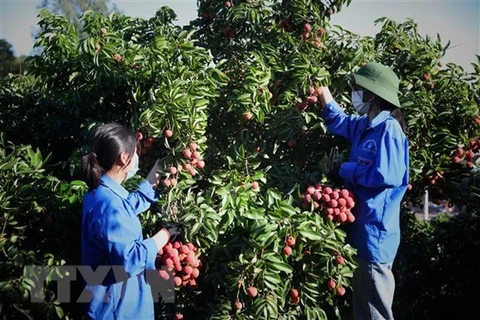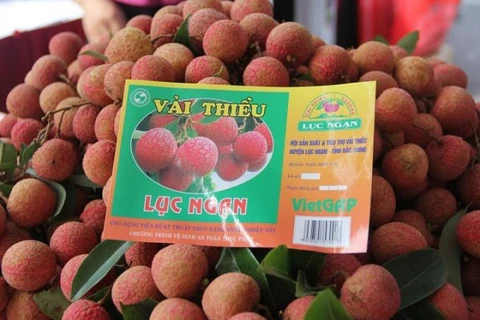Hanoi (VNA) – July marks the end of the lychee season in China but the main harvest in Vietnam. Therefore, domestic firms are advised to optimise this opportunity to boost exports to the neighbouring country.
Vietnamese exporters will face less competition in the market if the shipments are made from this month, said Dang Phuc Nguyen, Secretary General of the Vietnam Fruit and Vegetables Association.
Vietnam’s lychee exports to China are expected to rise sharply this year thanks to the neighbour’s reopening, he said, noting that apart from product quality, it is necessary to facilitate visa licencing and travelling of Chinese traders in order to boost the delivery.
Both the northern provinces of Hai Duong and Bac Giang, Vietnam's lychee hubs, have been preparing for the harvest. This year, the country’s combined lychee output is expected to reach 330,000 tonnes.
However, high logistics costs and issues regarding plant quarantine and customs clearance remain concerns among lychee exporters.
Given this, lychee growing localities have proposed the Vietnamese trade office in China hold working sessions with relevant Chinese agencies to speed up customs clearance, thus easing congestion at border gates, while helping them seek Chinese partners.
According to Nguyen Huu Quan, a representative of the Vietnamese trade office in China's Nanning, after the country relaxed COVID-19 restrictions, a number of its border localities, including Guangxi province, has flexibly adjusted pandemic prevention and control measures during customs clearance.
Quan also pointed out that border gates and roads leading to them from Vietnam are being upgraded, causing the risk of goods congestion, especially in Lang Son province.
He, therefore, suggested enterprises get updates on the situation at border gates to hold negotiations with their partners, thus minimising losses caused by the congestion.
To Ngoc Son, deputy head of the Vietnamese Ministry of Industry and Trade (MoIT)’s Asia-Pacific Market Department, noted that China has allowed the import of fruit via some border gates in Quang Ninh, Cao Bang and Lao Cai provinces, suggesting Vietnamese businesses negotiate with Chinese partners to move their transactions to the sites./.
Vietnamese exporters will face less competition in the market if the shipments are made from this month, said Dang Phuc Nguyen, Secretary General of the Vietnam Fruit and Vegetables Association.
Vietnam’s lychee exports to China are expected to rise sharply this year thanks to the neighbour’s reopening, he said, noting that apart from product quality, it is necessary to facilitate visa licencing and travelling of Chinese traders in order to boost the delivery.
Both the northern provinces of Hai Duong and Bac Giang, Vietnam's lychee hubs, have been preparing for the harvest. This year, the country’s combined lychee output is expected to reach 330,000 tonnes.
However, high logistics costs and issues regarding plant quarantine and customs clearance remain concerns among lychee exporters.
Given this, lychee growing localities have proposed the Vietnamese trade office in China hold working sessions with relevant Chinese agencies to speed up customs clearance, thus easing congestion at border gates, while helping them seek Chinese partners.
According to Nguyen Huu Quan, a representative of the Vietnamese trade office in China's Nanning, after the country relaxed COVID-19 restrictions, a number of its border localities, including Guangxi province, has flexibly adjusted pandemic prevention and control measures during customs clearance.
Quan also pointed out that border gates and roads leading to them from Vietnam are being upgraded, causing the risk of goods congestion, especially in Lang Son province.
He, therefore, suggested enterprises get updates on the situation at border gates to hold negotiations with their partners, thus minimising losses caused by the congestion.
To Ngoc Son, deputy head of the Vietnamese Ministry of Industry and Trade (MoIT)’s Asia-Pacific Market Department, noted that China has allowed the import of fruit via some border gates in Quang Ninh, Cao Bang and Lao Cai provinces, suggesting Vietnamese businesses negotiate with Chinese partners to move their transactions to the sites./.
VNA
























